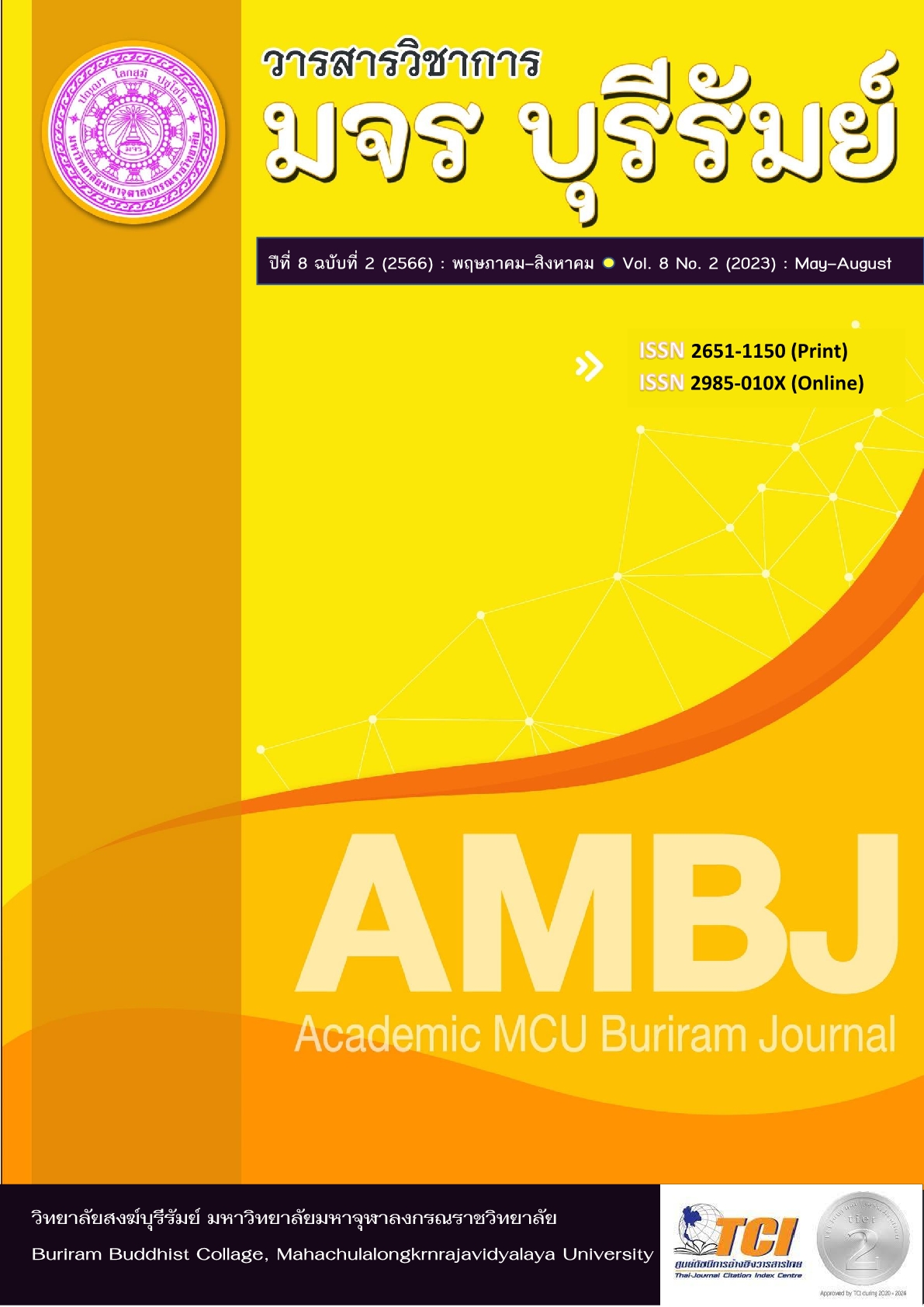An Analysis of Beliefs in Karma of Thai People in Modern Times according to Theravada Buddhist Philosophy
Abstract
The purpose of this research were: 1) to study the problematic belief in Karma of Thai people in modern times, 2) to study Karma in Theravada Buddhist philosophy and 3) to analyze the belief in Karma of Thai people in modern times according to Theravada Buddhist philosophy. It is a documentary research by studying from Tripitaka etc. The results of research were then presented using a descriptive analysis method.
The research results found that:
1. Thai people in modern times have believed in Karma that has various implications that is different from the doctrine of Karma in Buddhism, for example, some groups of Thai people in modern times have the idea and belief that there is no sin, merit, goodness, badness or there is no merit etc. There is also the fact that Karma that has been done has no effect on the next life by believing that what has been done, both good and evil, will end after it has been done.
2. The principle of Karma in Buddhism teaches that Karma is an individual action, even if it's charity, it's good Karma and unwholesomeness is evil whether the karma is good or bad. The one who does Karma will get the result of that Karma, when there is a belief in Karma regardless of whether the karma that is done will lead to good or bad karma, there will always be consequences. If person do good deeds, he will be born in heaven, but if doing bad deeds, he also will be born in hell.
3. To analyze the beliefs about the karma of Thai people today lets us know that Thai people nowadays will have a clearer understanding of the principles of good and evil or good and bad things that are consistent with the principles of Karma in Buddhism. There is a belief about the effects of individual actions that have been done, both good-evil, and good things-bad things that will definitely reflect back on the action. No one can completely escape the consequences of each person's actions.
References
พระเทพเวที (ประยุทธ ปยุตฺโต). (2513). กรรมตามนัยแห่งพุทธธรรม. กรุงเทพมหานคร: อัมรินทร์พริ้นติ้ง กรุ๊พ จำกัด.
พระธรรมปิฎก (ประยุทธ์ ปยุตฺโต). (2544). ปฏิบัติธรรมให้ถูกทาง. พิมพ์ครั้งที่ 60. กรุงเทพมหานคร: มูลนิธิพุทธธรรม.
พระธรรมปิฎก (ประยุทธ์ ปยุตฺโต). (2549). กรรมและนรกสวรรค์สำหรับคนรุ่นใหม่. พิมพ์ครั้งที่ 3. กรุงเทพมหานคร: สหธรรมิก.
พระพรหมคุณาภรณ์ (ป.อ. ปยุตโต). (2559). พจนานุกรมพุทธศาสตร์ฉบับประมวลธรรม. พิมพ์ครั้งที่ 36. กรุงเทพมหานคร: สำนักพิมพ์ ผลิธัมม์.
พระมหาพิเชษฐ์ ธีรวํโส (ดอกรัก). (2534). การศึกษาเชิงวิเคราะห์เรื่องกรรมและสังสารวัฏในพุทธปรัชญาเถรวาท ที่มีผลต่อการดำเนินชีวิตของพุทธศาสนิกชนไทยในปัจจุบัน. วิทยานิพนธ์พุทธศาสตรมหาบัณฑิต. บัณฑิตวิทยาลัย: มหาวิทยาลัยมหาจุฬาลงกรณราชวิทยาลัย.
พระสรณ์สิริ ปชฺชลิโต (โททอง). (2552). ทัศนคติเรื่องกรรมในพระพุทธศาสนา: กรณีศึกษาดารานักแสดงและนักร้องสถานีวิทยุโทรทัศน์ทีวีสีช่อง 3. วิทยานิพนธ์พุทธศาสตรมหาบัณฑิต. บัณฑิตวิทยาลัย: มหาจุฬาลงกรณราชวิทยาลัย.
พระมหาประศักดิ์ อคฺคปญฺโญ (ชั่งแสง). (2541). ความเชื่อเรื่องโหราศาสตร์กับกฎ แห่งกรรมของชาวพุทธไทยในปัจจุบัน. วิทยานิพนธ์พุทธศาสตรมหาบัณฑิต. บัณฑิตวิทยาลัย: มหาวิทยาลัยมหาจุฬาลงกรณราชวิทยาลัย.
พระอุทัย จิรธมฺโม (เอกสะพัง). (2543). ทัศนะเรื่องกรรมในพระพุทธศาสนาเถรวาท และปัญหาเรื่องกรรมในสังคมชาวพุทธไทยในปัจจุบัน. วิทยานิพนธ์พุทธศาสตรมหาบัณฑิต. บัณฑิตวิทยาลัย: มหาวิทยาลัยมหาจุฬาลงกรณราชวิทยาลัย.
มหาวิทยาลัยมหาจุฬาลงกรณราชวิทยาลัย. (2539). พระไตรปิฎกภาษาไทย ฉบับมหาจุฬาลงกรณราชวิทยาลัย. กรุงเทพมหานคร: มหาจุฬาลงกรณราชวิทยาลัย.
สมเด็จพระญาณสังวร สมเด็จพระสังฆราช สกลมหาสังฆปริณายก (เจริญ สุวฑฺฒโน). (2550). อำนาจอันยิ่งใหญ่แห่งกรรม. กรุงเทพมหานคร: รุ่งเรืองวิริยะพัฒนา.
Downloads
Published
How to Cite
Issue
Section
License
Copyright (c) 2023 Academic MCU Buriram Journal

This work is licensed under a Creative Commons Attribution-NonCommercial-NoDerivatives 4.0 International License.
ทัศนะและความคิดเห็นที่ปรากฏในบทความวารสารฉบับนี้ถือเป็นความรับผิดชอบของผู้เขียนบทความนั้น ไม่ถือเป็นทัศนะและความรับผิดชอบของบรรณาธิการ





